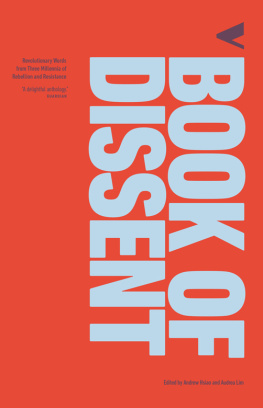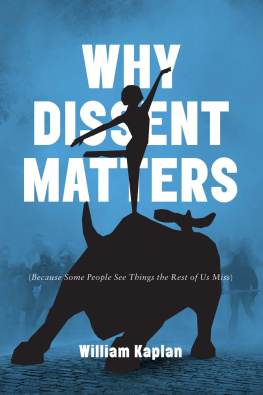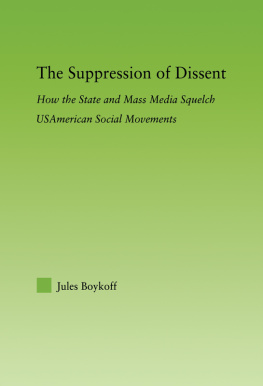Andrew Hsiao - The Verso Book of Dissent
Here you can read online Andrew Hsiao - The Verso Book of Dissent full text of the book (entire story) in english for free. Download pdf and epub, get meaning, cover and reviews about this ebook. publisher: Verso Books, genre: Art. Description of the work, (preface) as well as reviews are available. Best literature library LitArk.com created for fans of good reading and offers a wide selection of genres:
Romance novel
Science fiction
Adventure
Detective
Science
History
Home and family
Prose
Art
Politics
Computer
Non-fiction
Religion
Business
Children
Humor
Choose a favorite category and find really read worthwhile books. Enjoy immersion in the world of imagination, feel the emotions of the characters or learn something new for yourself, make an fascinating discovery.
- Book:The Verso Book of Dissent
- Author:
- Publisher:Verso Books
- Genre:
- Rating:3 / 5
- Favourites:Add to favourites
- Your mark:
- 60
- 1
- 2
- 3
- 4
- 5
The Verso Book of Dissent: summary, description and annotation
We offer to read an annotation, description, summary or preface (depends on what the author of the book "The Verso Book of Dissent" wrote himself). If you haven't found the necessary information about the book — write in the comments, we will try to find it.
The Verso Book of Dissent — read online for free the complete book (whole text) full work
Below is the text of the book, divided by pages. System saving the place of the last page read, allows you to conveniently read the book "The Verso Book of Dissent" online for free, without having to search again every time where you left off. Put a bookmark, and you can go to the page where you finished reading at any time.
Font size:
Interval:
Bookmark:


Revolutionary Words from Three Millennia of
Rebellion and Resistance
Preface by Tariq Ali
Edited by Andrew Hsiao and Audrea Lim
New Edition

This edition published by Verso 2016
First published by Verso 2010
The selection Verso 2010
Preface Tariq Ali 2010, 2016
All rights reserved
The moral rights of the author have been asserted
1 3 5 7 9 10 8 6 4 2
Verso
UK: 6 Meard Street, London W1F 0EG
US: 20 Jay Street, Suite 1010, Brooklyn, NY 11201
versobooks.com
Verso is the imprint of New Left Books
ISBN-13: 978-1-78478-617-5
ISBN-13: 978-1-78478-308-2 (US EBK)
ISBN-13: 978-1-78478-309-9 (UK EBK)
British Library Cataloguing in Publication Data
A catalogue record for this book is available from the British Library
Library of Congress Cataloging-in-Publication Data
A catalog record for this book is available from the Library of Congress
Typeset in Bembo by Hewer Text UK Ltd, Edinburgh
Printed and bound by CPI Group (UK), Ltd, Croydon, CR0 4YY
The big bee flies high,
The little bee makes the honey;
The black folks makes the cotton,
And the white folk gets the money.
Leadbelly
Dissenting voices and rebellions against existing authoritypagan, tribal, religious, civil, feudal, bourgeois and Communistform a global pattern. They have always existed in some shape or another. It is sometimes automatically assumed that conflict in ancient times or the medieval period, and even the English, Dutch and French revolutions, lacked the clarity, insight and precision of twentieth-century upheavals. This was not always the case. There are good reasons why the slave rebellion led by Spartacus left such a deep mark on history and was to be forever remembered, especially by the European theorists and practitioners of revolution in the nineteenth and twentieth centuries. It was not accidental that the highly literate and cultivated German revolutionaries of the early twentieth century named their organization Spartacusbund, only to be crushed just as ruthlessly by the German state as the slaves who dared to free themselves were by its antique Roman predecessor.
Or take the example of 2 BCE Sparta; here, a huge class fissure developed in the two centuries following the Peloponnesian conflict, unusually for that city-state accustomed to all its male citizens carrying out similar military tasks. The gap between rich and poor grew so wide that a revolution from above, backed by the peasantry, became inevitable. The class divide precipitated a set of socio-politico-economic reforms that prefigured all the struggles in the modern world and created a city-state that was more politically advanced than, to take but one instance, contemporary Britain.
A triumvirate of three radical monarchsAgis IV, Cleomenes III and Nabiscreated a structure to help revive the state on a new basis: nobles were sent packing into exile; the dictatorship of magistrates was abolished, slaves were given their freedom, all citizens were allowed to vote and lands confiscated from the rich were distributed to the poor. The early Roman Republic, threatened by this example, sent its legions under Quintus Flaminius to crush Sparta. According to Livy, the great Roman historian of Antiquity, Nabis responded with a cold anger but great dignity:
Do not demand that Sparta conform to your own laws and institutions You select your cavalry and infantry by their property qualifications and desire that a few should excel in wealth and the common people be subject to them. Our lawgiver did not want the state to be in the hands of a few, whom you call the Senate, nor that any one class should have supremacy in the State. He believed that by equality of fortune and dignity there would be many to bear arms for their country.
Had Charles I, Louis XVI and Abdulmecid I followed the example of the Spartan rulers, the history of Europe might have taken a different course. These episodes alone, properly contextualized and described in detail, could take up half a book, but all anthologies are notorious for their inability to satisfy every reader. That is the nature of the beast.
The Verso Book of Dissent is no exception, but there is a difference. Unlike its various predecessors in the Anglophone world, we have attempted to cover the entire globe. The book was compiled in our offices in New York and London with the help of authors and friends of Verso across every continent. To do proper justice to the subject, we would have needed several editors stationed in different parts of the world, unlimited time and resources to produce a three-volume encyclopedia on this theme. Logistical problems and material scarcity made this an impossible task. Speed was essential since the volume marks the fortieth anniversary of New Left Books/Verso, a publishing endeavor that has survived the fall of the Berlin Wall because it challenges the established verities of all the different worlds that existed in 1970 when it was founded: the United States and its satellites, the Soviet Union and its subordinates, with China and India, amongst others, also subjected to critical analyses. Entire thought-systems and state structures, economies capitalist and non-capitalist were analyzed and challenged by many of our authors. The contrast between the vision of socialism defended by Marx and the reality of the post-capitalist states was too stark to be ignored. Dissenting voices from Eastern Europe and China always found a place in Verso catalogues.
We were fortunate in that the group of people who founded New Left Books/Verso were, in the main, associated with the New Left Review. Intellectual affinities with NLR essayists were the foundation stone of New Left Books before it expanded and created Verso as its paperback arm in 1975: Perry Anderson did the books, Anthony Barnett did the first business plan with a handwritten cash flow in red and blue. More importantly, Barnett understood the crucial importance of a single-market strategy, retaining and re-taking rights to the US market that helped establish Verso as a transcontinental publishing house a good decade before many illustrious publishing names followed suit. The name Versothe left-hand pagewas Francis Mulherns suggestion and only squeezed through the horse-race mechanism deployed by the NLR editorial committee, displacing more popular suggestions that included October, Salamander and Arcades. We owe a debt to Mulhern.
In 1970, the first book published by New Left Books was Ernest Mandels Europe versus America: The Contradictions of Imperialism, a sharp polemical response to the French liberal politician Jean-Jacques Servan-Schreibers The American Challenge: a plea in favor of Europe becoming Americas permanent second fiddle and for France to break with all Gaullist ideas of independence. On this, Servan-Schreiber, we must regretfully acknowledge, appears to have been totally vindicated by history. In 2010, Perry Anderson revisited the subject in his The New Old World, which revealed the consequences of EU Atlanticism. A deep crisis confronted the European elites: a growing democratic deficit at home, the adoption of the economically disastrous Wall Street system and the support for American wars and policies in the world, in many cases against the expressed desires of European citizens.
Font size:
Interval:
Bookmark:
Similar books «The Verso Book of Dissent»
Look at similar books to The Verso Book of Dissent. We have selected literature similar in name and meaning in the hope of providing readers with more options to find new, interesting, not yet read works.
Discussion, reviews of the book The Verso Book of Dissent and just readers' own opinions. Leave your comments, write what you think about the work, its meaning or the main characters. Specify what exactly you liked and what you didn't like, and why you think so.









